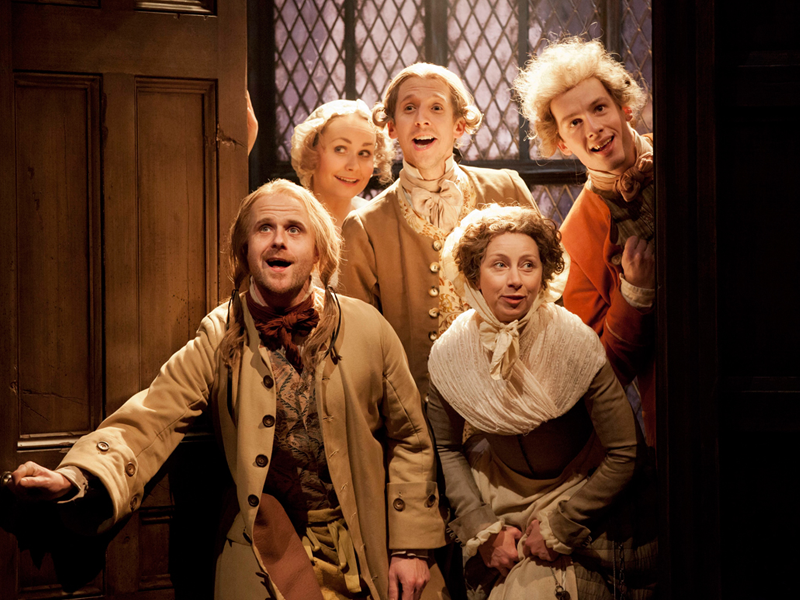
Tatyana Kytsenko: The theatre as entertainment is long gone
The national classical theatre is in a coma. Barely alive and breathing, sort of, but it’s been hopelessly immobilized for too long. It’s a corpse lying under a duvet of meagre investment, assembling a tiny congregation of devotees to bow before its questionable aesthetic.
And yet, theatre itself seems to be alive, youthful, full of good cheer, running toward the light at the end of the tunnel, and is housed in the exquisite Temple of Melpomene - the Muse of tragedy herself.
Evenings, the columned structure lights up and lovers of beauty shiver with reverence as they climb the stairs toward the glorious and inviting portal. Once inside, it all starts off with a humble clothes hanger and an offer of opera glasses, which many accept, and bedecked in their finest they move as one to the great hall and are seated in plush armchairs, elevated high above their concrete slab tenements and bursting trash bins and long-derelict urban infrastructure, teacher-parent conferences and sad, domestic scandals.
Parallel reality
A ticket to the theatre is a ticket to another reality, the viewer securely settled in the auditorium and before him, in the box defined by Stanislavsky, the action takes place. And oh! An actor has approached the stage through the auditorium: what thrilling innovation!
It’s intermission and, without fail, here’s the buffet! There are, word has it, performances that would be simply unwatchable were no buffet available.
After which the "presentation" continues, and a snifter of cognac has helped fill the stage with even more vibrant colours. Angelic beings, actors in breathtaking costumes or something less-than, play at this or that irrelevance. The antagonist torments the protagonist, but good acquits itself and, against all odds, emerges victorious! Hip! Hip! Hooray! A finale as cathartic as it is life-affirming!
And even if on this night they are not particularly delighted, a grateful public applauds. Oh, how the actors gave it their best! As did the director. Say nothing of the artistic director. The theatre staff. So many trying so hard. Rise now and clap hands as one! The local protocol must be observed. Now to the WC and finally, back to the coat check.
This is a well-adjusted theatre. With an administrator who always knows what will fly and what will not. A repertoire filled with love, and loaded with the sublime-the good-the timeless: "The Cherry Orchard", "Anna Karenina", "The Importance of Being Earnest". Any living dramatist can explain why Shakespeare is unequalled, the appropriate number of actors required and their appropriate ages. And then there’s always the tried-and-true approach of sending a phalanx of three or four middle-aged women to ply the director to give your play – it can’t miss, they intone – a chance.
In any case, a normal playwright should always follow a formal aesthetic: He, She, Black Angel, White Angel. Instructive plots, educational goals, high truths. It is also desirable that in addition to all this the author die a conveniently timed (before the curtain goes up) and good death and “take his rest.”
Yet, all this sublime beauty is nothing more than a vision seen by a man in a coma. In reality, a crucial half of the internal organs of the patient are non-functioning, and those vaunted higher truths lie lifeless nearby, possessed of all the vigour of a dissipating duck fart. And so it may appear that the best solution here is euthanasia – the merciful and assisted demise of a desiccated husk of a theatre that has been hanging on for decades.
For those looking for a good cry or a good laugh, all that’s needed is to punch a button on a TV remote. Any one of the countless domestically produced series pulls in between five and twenty-five million (!) viewers, while even the best theatrical production will be seen by a crowd numbering no larger than one-thousand. The theatre as entertainment is long gone. There is nothing to fear here. Nothing to be lost. In this intractable situation the theatre should offer that which television and cinema cannot.

"And Now for Something Completely Different"
Setting aside television and its quest to please everyone, the theatre should give serious consideration to its specific target audience. Why all the calls to "Turn off the TV and come to the theatre?" The optimal target audience for the theatre would be those who watch no television at all – worn down by restrictions to the format, manipulative plots, endless train of criminals and pitiable allegories.
The theatre, having left behind the desire to please everyone all the time, is in possession of a unique opportunity to become a free-play zone, limited only by the criminal code. A place where no one - neither the stagers of the production, nor the audience – are obligated to be on their best behaviour. Where everyone is free to reveal their authentic self. A place where the acute, the painful, the chronic, the hushed issues of society, those too intolerable to discuss but even harder to live with, are given a voice. And in place of viewer tucked into a safe, velvet and brass-studded armchair but far removed from the action, the viewer awaits a provocation, perhaps a scandal, and almost certainly a psychic shake-up. Something that is not an end in itself, but a means to altering his angle of view.
Contemporary theatre selects uncomfortable topics - war, crime, homosexuality, domestic violence – traversing psychic landscapes marked by anxiety and ambivalent emotion. It works to examine and analyze what is happening all around us, asking questions, casting doubt on the once immutable, the viewer’s reaction an examination of his internal emotional climate. And present phenomena are expressed in symbol, made accessible and empowered to move the viewer to relevant action.
The most conservative artists and directors are horrified: and what if a maniac shows up with a bomb? What if an audience member can’t bear it and locks himself in the toilet to slit his wrists? What then? Let all the actors go! Shoot the playwright! Let the director swing! Yet, this, and more, is possible on the streets outside the theatre. No performance necessary. The palpable tension among the public is so great that it becomes unbearable. But the benefit to the theatre is clear: it has once again become socially significant. It has aided those who seek to find their place in the social order.

A Bit More about Target Audience
Even when preparing to attend classical theatre an audience has traditionally readied itself, at the very least, by reading the play to be staged. Still...just forget it...the stupefied consumer of television serials expects everything to be laid out for him and crystal clear.
Contemporary theatre can afford to be "incomprehensible", complex, intellectual, even somewhat elitist. The productions often require rather serious preparation on the part of the viewer. And here the producers have already determined who will be prepared and how they’ll do it. During the pre-production stage of a piece, European theatres produce a wealth of relevant literature, conduct classes for theatre-goers, equipping the performance with a kind of interactive preparatory intro. This is all essential to the play, the materials and approaches prepared varying from production to production. And all of it completely normal.
Let’s Talk
It's one thing to talk to a television, quite other to communicate with living people - something possible only in a theatre that is not comatose, where the core conflict does not occur between the characters on the stage, but between the stage and the hall. Communication, discussion are not merely possible, but necessary. Is the crowd angry, worked up? Perfect. Chief in this case is the process of internal change brought about in each participant. Gently stroking their fur is no way to reach them.
Contemporary theatre has done away with a great deal. The supporting columns of classical theatre – conflict, plot, genre – are subjected to a reconsideration. Everything is in flux: the texts, the staging, the acting. Professional standards are being rethought. The form is rendered equal to the content. And now, as the canon has been shattered, rebuilt, rendered conditional, each new staging a game with its own set of rules. There remains only one obligation: theatre will not provide solutions, ready-made answers, demarcations of wrong and right, good and bad. Contemporary theatre asks. Contemporary theatre explores.

---
Photo Credits:
1 Playwright and screenwriter Tatyan Kytsenko. Photo ©Andrey Kotchyn
2 Shakespeare’s Globe Theatre. The Globe to Globe Festival, opening of the 2012 London Cultural Olympiad. “King Lear” – Vladimir Shcherban, director; stage adaptation by Nikolai Khalezin. Pictured: Victoria Biran, actress. Photo ©Nikolai Khalezin
3 Shakespeare’s Globe Theatre. The Globe to Globe Festival, opening of the 2012 London Cultural Olympiad. “King Lear” – Vladimir Shcherban, director; stage adaptation by Nikolai Khalezin. Pictured: Pavel Arakelian, Oleg Sidorchyk, Sergey Kvachenok, Kiril Masheko. Photo ©Nikolai Khalezin
4 “The Women and the Sniper” by Tatyana Kytsenko at the Theatre Magdeburg. Producer, Aleksandr Senchuk. The Wild East Festival – the Ukrainian Phenomenon, 2016. Pictured: Raphael Kübler (Seryozha), Marie Ulbricht (Marina), Michaela Winterstein (Anna Ilinichna), Sebastian Reck (Uncle Maya), Timo Hastenpflug (Lyosha). Photo ©Nilz Böhme




